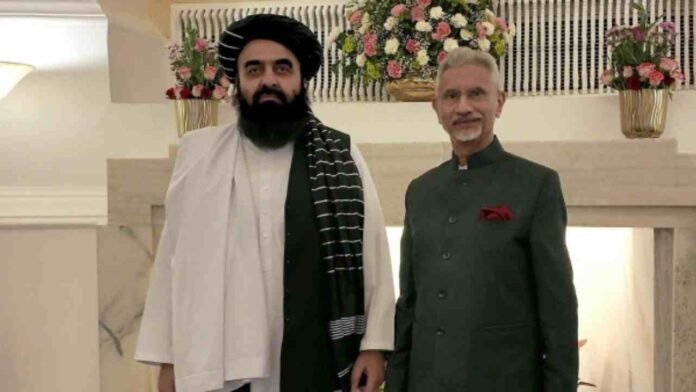Known as the ‘graveyard of empires’, Afghanistan has seen a change of guard several times over the centuries. The latest change took place in 2021 when the Taliban group, in a lightning offensive, seized power after being ousted by US-led forces in 2001 as part of its ‘War on Terror’. Ever since the Taliban 2.0 came to power, key actors in the world have adopted varying attitudes towards the group, with the vast majority treating it as a pariah.
However, change is the new ‘normal’ in the foreign policy of every country. In this context, a seismic shift is underway in India’s foreign policy. The foreign minister of the Taliban movement, Amir Khan Muttaqi, was in India for his first official bilateral visit. He met with External Affairs Minister S Jaishankar, and a range of bilateral cooperation pacts were signed. The areas of cooperation included education, health, satellite communication, etc. He also held meetings with other important stakeholders in India over the next few days.
With that said, the visit must be analysed from the perspective of the changing considerations of India’s strategic policy.
India’s Afghanistan policy has been guided by a humanitarian and people-to-people dimension, with economics as the base of the relationship. However, India has changed its stance dramatically, allowing pragmatism to shape its policy
Pragmatism is the Guiding Principle
India’s foreign policy towards Afghanistan has been guided by a strong humanitarian and people-to-people dimension, with economics acting as the base of the relationship. However, when the Taliban came to power in 1996 following a power struggle, New Delhi heavily dialed down the nature of the relationship, given the extreme interpretation of Islam the Taliban professes and their controversial social outlook.
However, this time, New Delhi has decided to dramatically change its stance. The bilateral visit of a key figure in the Taliban government is symptomatic of how New Delhi is allowing pragmatism to shape its actions.
One of the primary issues that New Delhi seems to keep in mind is the resource-rich nature of the landlocked country. According to reports, Afghanistan is sitting on mineral reserves whose cumulative value is estimated to be $1 trillion. Among these resources, minerals account for the lion’s share. The important minerals include iron, aluminum, copper, and, among critical minerals, gold, cobalt, and lithium. Within the mineral portfolio, lithium is considered the most important. Lithium is a key component in manufacturing various commodities such as semiconductors, electric vehicles, and batteries. Further, lithium is regarded as the go-to mineral in terms of expanding the basket of renewable energy; vehicular emissions account for more than 10% of India’s Greenhouse Gas Emissions. New Delhi would therefore be keen to harness that mineral resource.
Afghanistan has mineral reserves worth $1 trillion. Its important minerals include iron, aluminum, copper, and critical minerals gold, cobalt, and lithium. Within the mineral portfolio, lithium is considered the most important today
Bulwark against the US-Pakistan Axis
In recent months, Pakistan has moved closer to the United States. It is in that context that India, by playing host to the Taliban rulers of Afghanistan, is sending out a message to the duo that India will not remain a mute spectator. In recent years, ties between the Afghan Taliban and the Pakistani civilian-military apparatus have experienced strain due to many reasons. The most pertinent among them is the refusal of the Afghan Taliban to rein in the Pakistani Taliban or the Tehreek-e-Taliban Pakistan (TTP), which has made it its ultimate aim to attack the state institutions and armed forces of Pakistan, thereby bringing it to its knees to establish an Islamic state in that country.
Therefore, by exploiting the fissure between the two ideological siblings, New Delhi hopes to drive an even bigger wedge between the two and ultimately secure its strategic interests in Afghanistan.
Apart from that, ties between India and the United States have experienced turbulence in recent months due to India’s refusal to eschew Russian oil and give credit to the Trump administration for stopping ‘military hostilities’ between India and Pakistan in May this year. It is in that context that by reopening its diplomatic mission in Kabul, upgrading its technical mission to a fully fledged embassy, and by signing pacts with the Taliban, India hopes to contain American imperialism in that country.
Therefore, India seeks to gain strategic depth in Afghanistan by countering the US-Pakistan axis.
In recent months, Pakistan has moved closer to the United States. It is in that context that India, by playing host to the Taliban rulers of Afghanistan, is sending out a message to the duo that India will not remain a mute spectator
A Strong Counterweight
Apart from the need to counter the US-Pakistan axis, another key consideration that India is keeping in mind is China.
The objective is to act as a counterweight to Beijing. Ever since the Taliban seized power in 2021, Beijing has quickly moved in to dominate the strategic narrative. It has not only hosted important members of the Taliban but has also integrated Kabul in the Belt and Road Initiative (BRI). Apart from this, China has forged close contact with the Taliban to enhance its strategic weight in Afghanistan in general and expand the horizons of its overall influence in South Asia in particular.
This, therefore, must be seen as part of the dragon’s larger geopolitical vision – to encircle India via the continental route. As a part of its String of Pearls strategy, China has already established control over a network of ports and some naval bases around the world; this represents the maritime dimension of the doctrine. The outreach to the Taliban and inclusion in the BRI represent the continental dimension.
Hence, it can be concluded that by strategically warming up to a controversial entity like the Taliban, New Delhi has sent a clear message to state actors in South Asia and beyond that India’s foreign policy will no longer be guided by romanticism but by hardcore realpolitik considerations.
–The writer is currently working as a Research Associate at Defence Research and Studies (dras.in) and is a columnist. The views expressed are personal and do not necessarily reflect the views of Raksha Anirveda






